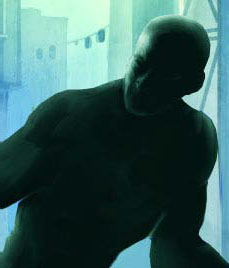
SESSION 18C: THE SMOKE OF THE FOUNDRY
March 22nd, 2008
The 7th Day of Kadal in the 790th Year of the Seyrunian Dynasty
ON SHILUKAR’S TRAIL
They headed back to the alley. This time all of them headed down the alley. A few moments later, the mysterious informant had again slid his away into the alley. (Elestra leaned over to Ranthir, “That’s a neat trick. I wonder if I could learn it?”)
 “I wasn’t expecting to see you again this soon,” he said. And then, catching sight of Tor: “And who is this?”
“I wasn’t expecting to see you again this soon,” he said. And then, catching sight of Tor: “And who is this?”
“Master Torland of Barund.”
“A pleasure to meet you. My name’s Shim. Now, what can I do for you all?”
“We need to find a thief named Shilukar.”
“And there’s a catch,” Tee said. “We need to find him by morning.”
Shim seemed to ponder it for a moment. “That’s a tall order. If it can be done, I’ll need a payment of 7,000 marks. And even if I fail, I’ll need 500 for my efforts.”
It was expensive, but they were out of options. They agreed and paid him the 500.
The carriage ride back to the Ghostly Minstrel – including a stop at the Hammersong Vaults to withdraw the cash they would need if Shim was successful – was subdued. They were excited by the prospect that they might soon have another opportunity to capture Shilukar and recover the idol from him, and they all took the time to congratulate Ranthir again on his quick-thinking, but they knew that they had a long wait ahead of them.
When they reached the Minstrel they quickly retired: Their long and busy day had exhausted them, and Ranthir in particular would need time to rest and prepare his arcane rites for the challenges of the day to come.
Unfortunately, they were not destined for a full night of rest and recuperation: Shortly after midnight, Elestra woke to find Shim sliding between the panes of her window.
“I don’t know what you’re doing in Agnarr’s room, but Shilukar is planning to attack the Foundry in the Guildsman’s District in less than 30 minutes. If you want him before dawn, this will be your only chance.”
Elestra quickly roused the rest of them. Tee saw to paying Shim and then they were off as quick as a carriage could carry them – their muscles still stiff and their bodies exhausted from their exertions. (more…)













